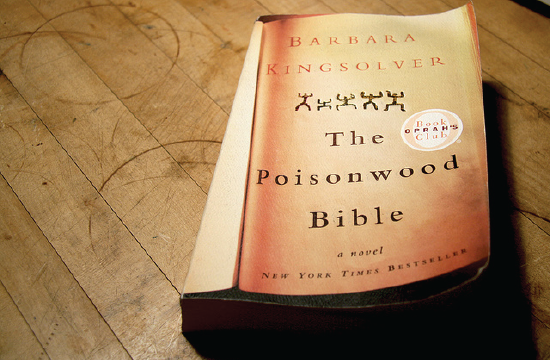Summary
Book Two: The Revelation raises the stakes for the characters by turning each of their desires on their heads. Leah wants her father’s approval; he continually punishes her. Rachel wants to go home and be a 20th century teenager; she’s left to swelter in the heat of the Congo. Ruth May wants to have fun; she breaks her arm. Orleanna wants to go home where she and her daughters can be safe from the deadly disease that has claimed many village children; Nathan Price wants to continue serving the Lord at the risk of them all. Adah is the only one who doesn’t seem to express a desire for change. She wants something deeper; she wants hope. She is the nonbeliever of the family, and yet she is the one who accepts life as it is and seeks to find hope where they are.
But Adah is not the only one who sees holes in their father’s teachings. Even Leah’s views begin to shift and she notes, “I always believed any sin was easily rectified if only you let Jesus Christ into your heart, but here it gets complicated.” (125) And Ruth May says, “Father is trying to teach everybody to love Jesus, but what with one thing and another around here, they don’t. Some of them are scared of Jesus… I’m scared of Jesus, too.” (194) Even as more people begin to attend Nathan Price’s church, it is clear that it’s not their faith in Jesus that’s growing but fear and, as Anatole explains, a desire for better luck.
Meanwhile, the Congo prepares for its first election, in which Patrice Lumumba will be elected, moving the country closer to independence from the Belgian colonialism that has ruled. With instability and unrest on the horizon, most of the family sees this as–and wants this to be–an opportunity to return home, but Nathan Price only becomes more resolute that the family will stay. The section ends with Adah finding Methuselah’s feathers, symbolizing to her a loss of hope.
Themes
Extreme cultural differences; Hope vs. despair; Colonialism and revolution
Powerful Lines*
- How we wives and mothers do perish at the hands of our own righteousness. I was just one more of those women who clamp their mouths shut and wave the flag as their nation rolls off to conquer another in war. Guilty or innocent, they have nothing to lose. They are what there is to lose. A wife is the earth itself, changing hands, bearing scars. (Orleanna, 108)
- It struck me what a wide world of difference there was between our games–“Mother May I?,” “Hide and Seek”–and his: “Find Food,” “Recognize Poisonwood,” “Build a House.” And here he was a boy no older than eight or nine. He had a younger sister who carried the family’s baby everywhere she went and hacked weeds with her mother in the manioc field. I could see that the whole idea and business of Childhood was nothing guaranteed. (Leah, 141)
- I wonder that religion can live or die on the strength of a faint, stirring breeze. The scent trail shifts, causing the predator to miss the pounce. One god draws in the breath of life and rises; another god expires. (Adah, 173)
- Bongo Bango Bingo. That is the story of Congo they are telling now in America: a tale of cannibals. I know about this kind of story—the lonely look down upon the hungry; the hungry look down upon the starving. The guilty blame the damaged. Those of doubtful righteousness speak of cannibals, the unquestionably vile, the sinners and the damned. It makes everyone feel much better. (Adah, 214)
Questions to Ponder
- What is the significance of the book sections’ titles (Genesis, The Revelation, The Judges, etc.)? Besides being books of the Bible, what meaning might they have? What is “the revelation” in this section?
- Consider Leah’s comment about the complication of morality in the Congo. How does one remain rightly related to a community whose culture is so different from, and even contrary to, one’s own sense of morality?
- What do you think the significance is of Methuselah residing over the homestead and what happens to him on the Congolese independence day? What might the following observation by Adah mean? “This is what he leaves to the world: gray and scarlet feathers strewn over the damp grass…None of what he was taught in the house of the master. Only feathers, without the ball of Hope inside. Feathers at last at last and no words at all.” (226)
- Sometimes we, like Nathan Price, have visions of what it looks like to serve the Lord and become frustrated by our failings. What is the difference between doing “the Lord’s work” and following Christ? Where do you think Nathan went wrong, and what could he have done differently?
*Quotes cited according to 2003 HarperTouch edition.



